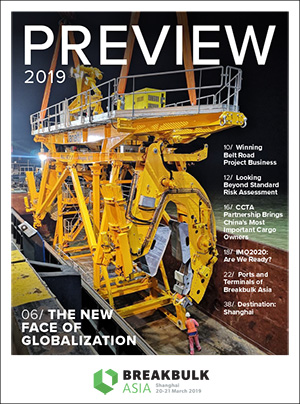Mar 07 | 2019
Maersk and Höegh Autoliners Share Preparations and Perspectives
 Ahead of Breakbulk Asia, our team posed these questions to Kristian Lund Knudsen, Head of Special & Dangerous Cargo Solutions, from Maersk, who will participate in the discussion around the impact of IMO2020 regulations, sure to be felt across our industry.
Ahead of Breakbulk Asia, our team posed these questions to Kristian Lund Knudsen, Head of Special & Dangerous Cargo Solutions, from Maersk, who will participate in the discussion around the impact of IMO2020 regulations, sure to be felt across our industry.BB: We’re less than a year away from compliance deadline, what can the industry expect when the new IMO fuel regulations come into effect? Best case? Worst case?
Knudsen: I can’t speculate about potential compliance issues with other carriers, I can only share what Maersk is doing in preparation. The vast majority of our approx. 750 ships will comply with the global sulfur cap through the use of compliant low-sulfur fuels in 2020. Strong enforcement of the regulation is key and Maersk supports the introduction of relevant and robust tools to ensure this. After 2020,
there would no reasons to have non-compliant fuels on-board. The recent adoption of the carriage ban on non-compliant fuels secured an important, robust enforcement tool.
BB: What are your views on the following options for compliance?
1. Low Sulfur Fuel
Knudsen: We currently consider the use of low sulphur fuel the best option for complying with the IMO fuel regulations. It’s a complex task to get a truly global fleet ready for such a significant change, but getting there remains a matter of preparation—using the time we have at hand to conduct lab tests and keep a close dialogue with suppliers to ensure adequate sourcing of the right fuels at the best possible price.
We are undertaking joint initiatives with Vopak and PBF Logistics for 0.5% compliant fuel storage and processing facilities in Rotterdam (NL) and New Jersey (US). Located in key network hubs for Maersk, the two facilities combined will cater for approximately one-third of the fuel demand in our fleet.
2. Refit vessels with scrubbers
Knudsen: Scrubbers form a secondary part of our overall IMO 2020 fuel sourcing strategy to ensure compliance and mitigate the risk of fuel price uncertainty in 2020. The vast majority of our fleet will comply with the global Sulfur cap through the use of compliant low-sulfur fuels in 2020.
3. Newbuilds-LNG
Knudsen: Maersk currently does not have any vessels fitted with LNG, but it may be an option for future newbuilds.
BB: What increase should shippers expect in rates for 2020 and beyond?
Knudsen: Shippers in the project, breakbulk and OOG sector should expect transportation cost to increase. Relative to the total logistics cost, the impact from the increased bunker cost will be minor.
External sources estimate additional cost for the global container shipping industry could be up to USD 15 billion and for Maersk alone, the cost of compliance could exceed USD 2 billion.
Customers should prepare to plan and budget for substantial shipping cost increases as of Q4, 2019, where bunkering of compliant fuels on our vessels will initiate. Maersk has changed its fuel adjustment surcharge (BAF) ahead of the IMO2020 Sulfur Cap. The BAF mechanism ensures a simple, predictable way of recovering the increased bunker cost.
Even with the new regulation in force, container shipping is the most cost competitive mode of transporting goods, with the transport price being only a fraction of consumer prices.
 How is Höegh Autoliners preparing for IMO 2020 and what is your greatest concern around this issue?
How is Höegh Autoliners preparing for IMO 2020 and what is your greatest concern around this issue?Höegh Autoliners welcomes the initiatives from IMO that helps the industry reduce its environmental footprint. Höegh has decided to comply with the new regulations by using Low Sulphur Oil or Marine Gas Oil on our vessels. We will not install scrubbers, because we do not see that as a longterm solution. In addition, scrubbers do not fit the type of vessel and the trading patterns that we have. The Low Sulphur and Marine Gas Fuel that Höegh will use, is today considerably more expensive than the High Sulphur Fuel and that price gap is expected to stay or grow in to 2020. With rates in the shipping industry already down to unsustainable levels, this is a cost that will need to be carried over to the customers, through Bunker Adjustment Factors in the contracts. In 2019, ensuring fair and functioning Bunker clauses in all contracts will be a focus area. To have the fleet prepared for 1 January 2020 Höegh Autoliners is performing an extensive cleaning program, cleaning all tanks on our vessels to ensure the Low Sulphur oil is not “contaminated” with residuals from the High Sulphur oil when that is being phased out.
How will the carrier industry look one year from today - best case, worst case?
We believe it is reason to be cautiously optimistic, with emerging markets expected to drive growth in the years to come. We see that for the breakbulk segment; South East Asia, Oceania and East and West Africa will be strong in the years to come. In the Middle East, the market for breakbulk is expected to improve. With a tense tariff and trade environment it is difficult to say what the trading patterns will be, and whether we will see a change within a year or not, but it is evident that the carrier industry will need to be ready to change vessel trading patterns faster than before. This sort of agility will be helped by better data collection, simulation and analysis that comes with the digitalization journey that the industry is going through.
RELATED SESSION
Wednesday, 20 March | 14:10 – 15:35 | Conference Theatre
Sea Transport Forum
14:10 – 14:35
I. Datahub: MPV Market Fleet Overview Increased regulatory requirements are driving changes to fleet configurations. What will the MPV look like in five years? Our fleet analyst will review current inventory, expected changes and insights for the future.
Ning Han, Director, Drewry China
14:45 – 15:35
II. Carrier Panel: IMO 2020
Only nine months remain before the global sulphur cap regulations take effect, but many questions remain unanswered about the real impact of the regulations on the shipping industry. Our panel of operators will discuss the questions on everyone’s minds, such as:
• Will there be a major change in the way the industry operates in 2020?
• How can breakbulk operators guarantee the supply of compliant fuel in all regions?
• Who will cover the added compliance costs – ship operators or shippers?
• What, if any, steps are in place to avoid disruption to service?
Moderator: Wei Zhuang, Regional Manager – Asia, BIMCO
Kristian Lund Knudsen, Head of Special & Dangerous Cargo Solutions, Maersk Oskar Orstadius, Höegh Autoliners
Steven Ou, Vice General Manager, SAL Heavy Lift
Jungmoo Roh, Managing Director and Head of China, EUKOR


